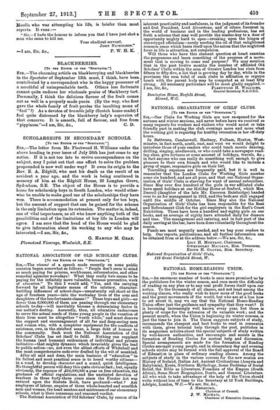NATIONAL ASSOCIATION OF OLD SCHOLARS' CLUBS. [To THE EDITOR OP
THE "SPECTATOR."] SIR,—The resume of a speech made recently on some public occasion began somewhat as follows : "People don't seem to mind so much paying for prisons, workhouses, reformatories, and other remedial agencies nowadays! What they really hate seems to be paying for the infinitely more valuable, because preventive, work of education." To this I would add, "Yes, and the carrying forward by all legitimate means of the salutary, character- building influences of school-days—unnaturally cut short at the age of fourteen years—into the workaday lives of the sons and daughters of the less fortunate classes !" These boys and girls—no fewer than 6,000,000 of them are passing through our elementary schools to-day—will inevitably become a determining factor in our nation's destiny. Assuredly, then, all educative endeavours to serve the actual needs of these young people in the vocation of their lives must be altogether "worth while," and must deserve the support and encouragement of all far and deep-seeing men and women who, with a completer equipment for the conflicts of existence, owe, in the strictest sense, a large debt of honour to the community. Such work the National Association of Old Scholars' Clubs has set itself to fulfil. Nothing can supplant the human (and humane) enthusiasm of individual and private initiative—that mighty dynamic which invariably gives the lead to public action—no, not even the ablest efforts of Whitehall and the most comprehensive code ever drafted by the wit of mankind. After all said and done, the main business of "education" in its fullest and most practical sense is to breed worthy citizens— in a word, to develop character and a sound, quick intelligence. No thoughtful person will deny this quite obvious fact ; but, equally obviously, the expense of £34,000,000 a year on free education, the guidance of official regulations, and the unstinted devotion of teachers in these forty-three years since the Forster Act was entered upon the Statute Book, have produced—what ? Ask employers of labour, enquire of those whole-hearted and unselfish men and women, the head masters and mistresses of our elementary schools, what is their consensus and reasoned verdict.
The National Association of Old Scholars' Clubs, by reason of its
inherent practicality and usefulness, in the judgment of its founder and first President, Lord Alverstone, and of others foremost in the world of business and in the leading professions, has set forth a scheme that may well provide the master-key to a door of opportunity mighty hard to open—creaking upon the hinges of stereotyped officialism—sorely needing the oil of that enlightened common sense which bases itself upon the axiom that the mightiest force in life is attraction, not compulsion.
Will those who have this clamant question at heart examine the programme and learn something of the progress of a move- ment that is moving to some real purpose ? We may mention that in the past twelve months the number of affiliated Old Scholars' Clubs within the area of Greater London has risen from fifteen to fifty-five, a list that is growing day by day, while in the provinces the sum total of such clubs in affiliation or organic touch with the parent body may be computed as at least fifty strong. All necessary particulars will be most gladly supplied.—
General Secretary N.A.,O.S.C.
Donington House, Norfolk Street, Strand, W.C.










































 Previous page
Previous page